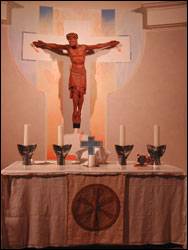"I want you to be true to your baptism."

 INTERVIEW with Rev. Jonathan FRAIS, an Anglican pastor in Kyiv, Ukraine
INTERVIEW with Rev. Jonathan FRAIS, an Anglican pastor in Kyiv, Ukraine
— Rev. Jonathan, introduce, please, yourself. Where are you from, how long have you been here in Ukraine?
— I'm 39. I was ordained to the Public Ministry of the Church of England 12 years ago. I arrived in Kyiv a single man in 1999 to look after what was called the Episcopal Morning Prayer Group. That gathering grew and we moved to two different venues (meeting places) until finally we came to our home here at St Catherine's German Lutheran Church where we are made to feel at home and Peter Sachi of the German Lutherans is a good friend to us. And so we meet on Sunday afternoons.
I met the woman who became my wife here and now we have two children – Hannah and Joshua. My wife's name is Ruth. She's a British believer. And she was here long before me. She was an English teacher at Bila Tserkva.
— What about your community here: who are members of it, how long do they usually stay in Ukraine - what nations, what occupations? What can youtell about these people?
— I inherited a group of twelve people in 1999. And we grew to a largest size of a hundred and ten this spring. But we said 'good-bye' to over 40 people in June. And now we are rebuilding and today we were about 60, including children. About a third of the congregation are Ukrainians, some of them interpreters, some of them translators, some of them students, one is a professor of British studies. The rest are either from North America, the USA or Canada, a few, not many, from Great Britain, some Africans. We had a visiting professor from Belgium in the congregation today, so, we get various visitors at different times - there was a Russian citizen in church today. The expatriates include one or two people from different embassies or consulates and, perhaps, some other international organizations. The only businessman, I think, who is regularly with us, is from an Indian pharmaceutical company.
And the denominations (confessions) are quite varied. About a third of our church members are from the Anglican Communion’s different provinces around the world. But on any given Sunday most of our people are not Anglicans. For instance, quite a few of them are Presbyterians from the USA.
— What attracted those other people to your services? The English language of services, I suppose, or because there are not other services for Baptists, Presbyterians, etc here in Kyiv, especially in English?
— There are other English-language services. If you turn to the Community page in section three of the Kyiv Post you'll find 6 or 7 English-language Services. Some of those include translation, and depending on whether you have a priority to learn Russian or Ukrainian that is a good thing or an obstacle.
Some people come, as you've suggested, simply because it's an English-language service. Some people come because they like the teaching through different books of the Bible in the course of the year. Some people like the Liturgy, the repeated prayers and the structure, which is a structure close to several other churches. For instance, sometimes a Roman Catholic (we have a Roman Catholic family here today) will say: "We recognize several of your prayers". And for some people it's important to have the breaking of bread every Sunday. For some people that's not their home tradition, but it can be an attraction for some. So it is about language, Liturgy, Bible teaching.
I think, for some, our central location is also a helpful thing. Many assume that getting to the Lutheran Church will take only 5 minutes to walk, but because it's uphill it takes 10. But it is near the Metro as well as near Khreshchatyk, and this helps. And for others being away from home - I think of expatriates - it is also an opening spiritually into the heart. They suddenly think they're happy to think of new things or think again about old things. And so some come and they do not know why they are coming - a friend has brought them, or they feel it the right thing to do. Maybe they're bored or lonely. Maybe, simply there's a hunger for God and they have to express it. Many different ways!
But I think the most interesting feature of our congregation is that the average length of time is 18 months (which reflects the short period of time many stay in Kyiv). Some of them stay for two or three years, but some of them stay only six months because they're teaching at the university for one term or so. Some of them stay as part of a first visit. Then they go away for something and come back. There are always visitors on Sundays, always a new face.
— I suppose that those people from abroad were believers in their countries, but maybe the Ukrainians are new believers or members of other churches? Why are they attracted to you?
— I think I want to answer the question partly by saying "I don't know", but partly also I am aware that there are some people who come from a church that they currently have problems with. It can be any church in Ukraine, and they're just looking for a time to think, and they come to us for a short time. They have a conversation with me, and I say: "I want you to be true to your baptism, I want you to be true to your home pastor, I want you to honor your family, I want you to do right by the culture of your country. If you want to be with us that's fine, but I'm not expecting you to stay for a long time." And often they appreciate that, and I say: "If you come, you're welcome, but I think, probably, it shouldn't be your home".
— What is the time of your services here and how do you exist in this place, a Lutheran church? Do Lutherans ask you to cover some costs or something like this?
— We meet at 3 pm on Sunday afternoons. That was not our first choice but the Lutherans' morning service begins at 10 and ends at 12 (in Russian and German), and it's not possible for us to meet close to that. But we have a good time in the afternoon and that works well for us. Initially we weren't sure if it would work well, I wondered if some people would stop coming, but it seems as though people are happy.
We work well with the Lutherans and we are their guests. Since the Meissen Agreement of 1991 the Church of England (the home of the Anglican Communion) and the EKD (Evangelical Churches in Germany - including Lutherans) have been working together.
— When I very accidentally came here today to your service, what attracted my attention was really your prayers the about heads of states, about the elections in Ukraine.
— Yes, it's interesting that you should show a particular interest in our prayers. Usually on a Sunday I ask one of our lay people to lead in prayer. And they have a set formula, but freedom to add extra prayers. We start with the church, then pray for the world, and then focus on our community. And as Anglicans we like to have this international perspective (whether we are in a European capital city or not). The words we say are these: "Guide the leaders of nations, and bless their families and their governments; we pray that for the heads of every nation here represented today, particularly those of Queen Elizabeth, President Bush and President Kuchma". Queen Elizabeth has the title “Supreme Governor of the Church of England,” President Bush is the leader of the world's most powerful nation, and President Kuchma is the president of the nation we meet in. So, these are the natural three names to put before our God. Now today, as you visited us after the first presidential round of voting, but before the second, you also heard me pray for the next round of the voting, for even-handed media treatment, and for the fair counting of votes afterwards. and for an honest process. I trust that this shows I'm more interested in the method than in the result. I believe the lesson of church history is that there are no perfect people, apart from our Lord, and we easily put great hopes in one person. It's not always wise to do this. Similarly, we often fear the worst about one person but such concerns do not always materialize.
So, I find the part of my job as a pastor is to warn people in general terms of foolish things, but also to remind them of their obligations as citizens, for instance, to vote, to pray and to care, whoever is the president.
— And the last question. What are your plans (personal and for community) for future? Do you feel the need to learn Ukrainian?
— My Russian is better than my Ukrainian but I think every visitor to this nation should try to learn one of them. Jesus said that his disciples were the salt of the earth and light to the world (Matthew 5:134, 16) and out task is always to be better at this calling.
— Thank you very much for your time.
— Thank you.
(interview done on 7 November 2004 in Kyiv)









